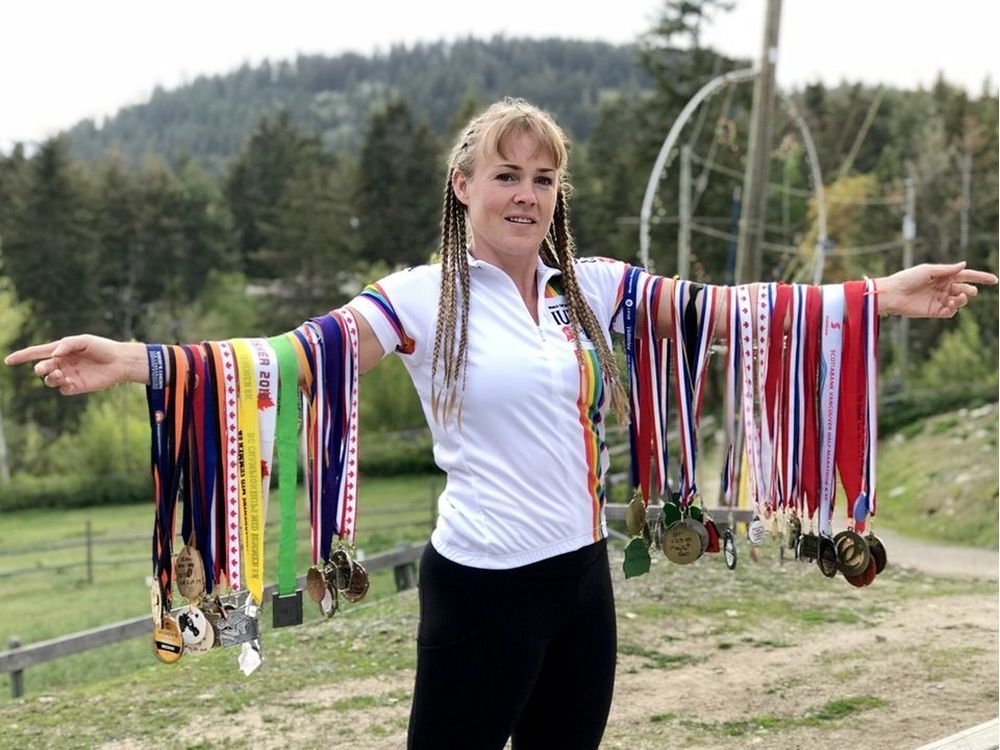Vernon ultra-triathlete set for 28-day race equivalent of 20 Ironmans

Credit to Author: Gordon McIntyre| Date: Fri, 04 Oct 2019 17:11:18 +0000
Invariably, people ask why.
Four weeks of soul-crushing exertion with sleep breaks of only three hours or so every day; 76 kilometres of swimming; 844 kilometres of running; 3,600 kilometres of cycling; all in the thin air 6,000 feet above sea level.
Why put yourself through that kind of gruelling punishment, both physical and mental?
“I have a love for challenging myself,” said 37-year-old Shanda Hill, an ultra-triathlete from Vernon. “These races aren’t just about who wins. You’re fighting your own personal barriers, your perceived limitations. I love that very much.”
Hill begins an ultra-triathlon Saturday in Leon, Mexico, a 28-day endurance test called a double-Deca, the equivalent of 20 Ironman triathlons. Only 14 ultra-triathletes are attempting this tortuous race; Hill is one of five women and the only Canadian, she said.
“I’ve completed three Decas, which are half the distance of this race,” she said. “This is the longest triathlon offered in the world at the moment. This right now is the height of where you can get in triathlon and it’s double every distance I’ve ever done.”
Shanda Hill of Vernon, one of the world’s top ultra-triathletes, is competing in a 28-day race at Leon, Mexico, from Oct. 5 to Nov. 2, 2019, that covers 76 kilometres of swimming, 844 kilometres of running and 3,600 kilometres of biking.
In 2017, Hill was ranked the No. 1 female ultra-athlete in the world by the International Ultra Triathlon Association after finishing second among women in one Deca, then winning the female division in another Deca two months later. According to IUTA, no woman had ever finished two Decas in a year before, let alone two months apart.
As a hobby, she wrestles alligators, helping relocate them rather than having them killed. But that is a story for another time.
To fully understand where Hill is today, you have to backtrack to 2003, a couple of days before Mother’s Day.
A 21-year-old Hill and a friend were cycling up Silver Star Mountain on their BMX bikes to see her folks when a Chevy Blazer 4×4 veered into the bike lane and smashed into her. She flew 30 feet in the air. Two things saved her: Her companion knew first aid and performed C-spine control to stabilize her neck and spine; and she was wearing her full motor-cross gear and full-face helmet.
Driven by ambulance to Vernon Jubilee Hospital, she had a pulse and was breathing, but was unresponsive. She eventually was diagnosed as having a broken back and traumatic brain injury.
Shanda Hill of Vernon, one of the world’s top ultra-triathletes, is competing in a 28-day race at Leon, Mexico, from Oct. 5 to Nov. 2, 2019, that covers 76 kilometres of swimming, 844 kilometres of running and 3,600 kilometres of biking.
In the many months that followed Hill’s behaviour changed drastically. There were no flashbacks, but she found herself overreacting, experiencing extreme mood swings, the littlest things seemed overwhelming, she couldn’t concentrate.
And she had constant headaches and backaches.
“It’s not something that gets easier to talk about,” she said over the phone from Mexico. “I’ve spoken a couple of times about my accident. If it helps somebody to share what I’ve gone through, I’m OK with talking about it.
“It’s something I feel has made me feel more determined. Had I not gone over, you know, ground that seemed so rough at the time, I don’t think I’d be where I’m at today.”
Bright lights and high-frequency noise still bother her. She has dizzy spells, swelling to the back of her neck. Memory loss and headaches.
Her mom has been incredible, Hill said. The entire family. Her 14-year-old son often runs with her as she trains or hops on his bike to ride with her. She credits them as much as her own stubbornness in proving the doctors back in 2003 and 2004 wrong, back when her goal was just to walk a kilometre.
When her son accompanied her to a past Deca in Switzerland, he got to see the athletes, got to see what they go through, Hill said.
“But he also saw somewhat ordinary people just doing incredible things, just because of their persistence and determination.”
CLICK HERE to report a typo.
Is there more to this story? We’d like to hear from you about this or any other stories you think we should know about. Email vantips@postmedia.com